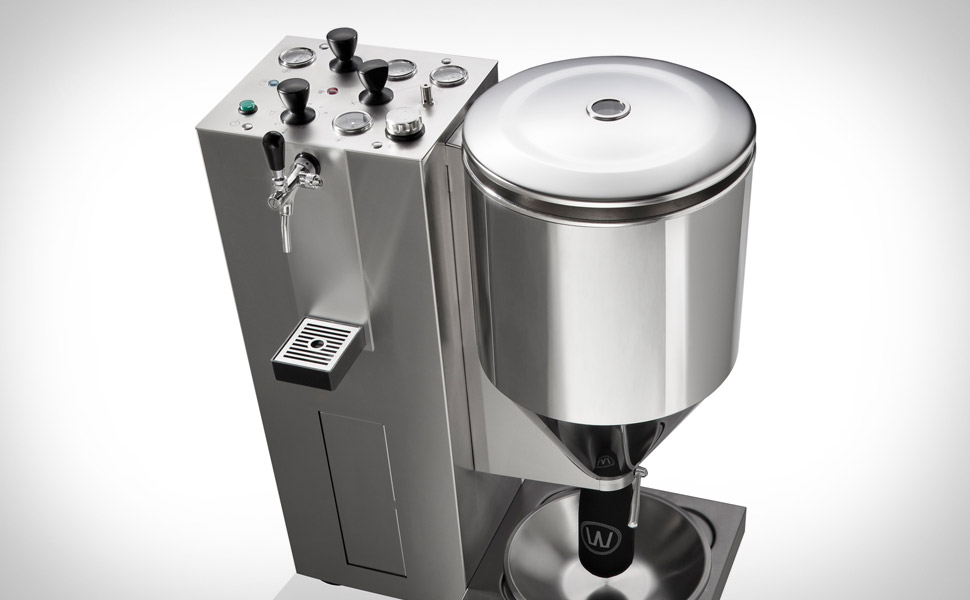After posting our article about the WilliamsWarn personal brewer we received a few really good comments on reddit.com. We took the questions that didn’t have answers in the FAQ section of the WilliamsWarn website and sent them over to Ian Williams and Anders Warn as a follow up. Below are the answers we received back from Ian. Thanks to those guys for taking the time to respond to us!!! Also, a big thanks to DCnC, deangreenz, kyleisgod, aphex732, and praxela for their opening comments on reddit!!
Several people have made comments about the cost. How long do you think it will be until the cost of the brewer comes down in price to something more reasonable for the average beer lover?
We are in negotiations with a US group about licensing production in the US. The price will likely be cheaper than here but I can’t confirm until we actually get the first made. Hopefully it’s a pleasant surprise for all of us.
Your site mentions a “special clarification agent”. What is this product and does it need to be purchased exclusively from you, or can it be bought from your local homebrew store?
This is one of our few secrets. Took me a while to figure this part of the process out so it’s our IP for the moment.
There have been questions about creating a quality beer product in such a short period of time. Due to the nature in which the brewer works are you limited to only certain types of beers? What types of beers have been found to not work well with this system?
The 7 day process is for ales. But it’s not short its quite normal and there’s nothing negative about it. Guinness is made in 5 days. Even Foster’s Lager is made in 7 days. Homebrewers have a tradition of long ageing due to the history when it was all bottled and aged for 7 weeks. The only reason they keep bottles for so long is to get them carbonated, it’s not for flavour. But it seems people think beer needs to be matured like wine. We’ve eliminated the extra carbonation step so don’t have the delay like in bottled or kegged homebrew. Beer is best fresh. It’s like bread. It stales. So the last thing you want to do is keep it lying around for some mythical ageing process to improve it. There are a few styles than can benefit in some cases from ageing but generally once you’ve got the flavour you want after fermentation its best to chill it, clear it and drink it. The main thing is to make sure you have no off-flavours before you put the cooling on.
For lager it can take a bit longer but it depends on how much yeast you pitch and what temperature you ferment at and the taste profile of the yeast. If you chose a lager yeast that ferments fast and doesn’t produce too much diacetly or sulphurs then the 7 days can almost be met in those circumstances too. But for really cold fermentations around 10’C it’ll take a while as those types of beers do. Can be weeks. But once fermentation is over and the beer is cold, clarification still only takes a day or so and then you can consume.
The only beers that may not work are those that may be made with a very non-flocculent yeast that our clarification agent can’t force out of the beer and the brewer wants clear beer. So we usually recommend to use yeast that will at least flocculate reasonably well.
A lot of brewers like to tinker with beers through the brewing process. How much flexibility is built into the system to allow this to happen or does the system work in a way that nothing can be changed after the process has started?
You can adjust the carbonation level to any level during fermentation
You can adjust the temperature during fermentation and maturation between 10-26’C
You can manipulate the clarity to a certain extent but we normally are aiming for clear beers in general so don’t do that very often
You can chose the dispense temperature
You can change carbonation levels afterwards
But the main tinkering you should be doing is with the ingredients at the start……
While you offer a solution to bottle the beer, you state the oxidation will allow it to last only 1-2 months. Is there any method to age the beer longer?
It’s me just being paranoid about oxidation. The beer will last many months if bottled well. It’s actually a matter of opinion. Beer oxidation happens to be my subject wihin brewing so I’m a little over-the-top about it. The average beer drinker doesn’t really know what beer oxidation is, although they do drink less beer when its oxidised. If you want aged beer for some reason then you can leave it bottled for years if you want.




Follow Us!